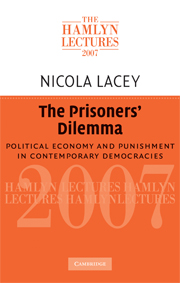Book contents
- Frontmatter
- Contents
- The Hamlyn Trust
- The Hamlyn Lectures
- List of figures
- Preface
- Part I Punishment in contemporary democracies
- 1 ‘Penal populism’ in comparative perspective
- 2 Explaining penal tolerance and severity: criminal justice in the perspective of political economy
- Part II Prospects for the future: escaping the prisoners' dilemma
- Bibliography
- Index
1 - ‘Penal populism’ in comparative perspective
Published online by Cambridge University Press: 31 January 2011
- Frontmatter
- Contents
- The Hamlyn Trust
- The Hamlyn Lectures
- List of figures
- Preface
- Part I Punishment in contemporary democracies
- 1 ‘Penal populism’ in comparative perspective
- 2 Explaining penal tolerance and severity: criminal justice in the perspective of political economy
- Part II Prospects for the future: escaping the prisoners' dilemma
- Bibliography
- Index
Summary
The state of criminal justice – the scope and content of criminal law, the performance of criminal justice officials, public attitudes to crime, and the extent and intensity of the penal system – is often used as a broad index of how ‘civilised’, ‘progressive’, or indeed ‘truly democratic’ a country is. A classic expression of this idea is that of Winston Churchill, who commented nearly a century ago that,
The mood and temper of the public in regard to the treatment of crime and criminals is one of the most unfailing tests of the civilisation of any country. A calm, dispassionate recognition of the rights of the accused, and even of the convicted criminal – a constantheart-searching by all charged with the duty of punishment – a desire and eagerness to rehabilitate in the world of industry those who have paid their due in the hard coinage of punishment: tireless efforts towards the discovery of curative and regenerative processes: unfailing faith that there is a treasure, if you can only find it, in the heart of every man. These are the symbols which, in the treatment of crime and criminal, mark and measure the stored-up strength of a nation and sign and proof of the living virtue in it.
In a development which has been particularly marked since the emergence of a rhetorically powerful framework of international human rights, data about criminal justice systems are standardly used to draw presumptive conclusions of democratic legitimacy or illegitimacy.
- Type
- Chapter
- Information
- The Prisoners' DilemmaPolitical Economy and Punishment in Contemporary Democracies, pp. 3 - 54Publisher: Cambridge University PressPrint publication year: 2008

